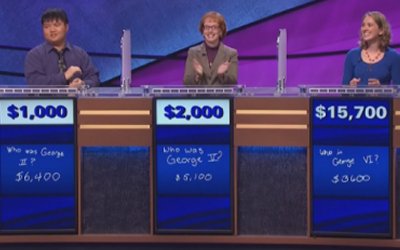Final Jeopardy: Math Terms (2-3-15)
The Final Jeopardy question (2/3/2015), in the category “Math Terms” was:
This word for a process that leads to a solution to a problem comes from the Arabic name of a 9th century mathematician.
It’s the second quarter-final match of the 2015 Teachers Tournaments and the teachers competing today are: Michael Jones from WI; Cathy Farrell, from Wyandotte, MI; and Lydia Cuffman, from Redwood City, CA.
Round 1: Michael found the Jeopardy! round Daily Double in “Presidential Moms” under the $1,000 clue before the first break. He was in third place with $800, $1,200 less than Cathy in the lead. He bet the $1,000 allowance and he was RIGHT.
Hannah Simpson. show
Lydia finished in the lead with $7,800. Cathy was second with $5,400 and Michael was last with $1,600.
Round 2: Cathy found the first Daily Double in “Quotable Plays” on the third pick in the round under the $1,200 clue. She was in second place with $6,200, $2,000 less than Lydia’s lead. She bet $3,000 and took a guess with “Raisin in the Sun.” That was WRONG.
“Alan’s always been such a gentle boy. He loves animals! Especially horses. show
Cathy found the last Daily Double in “A Long Time Ago in Canada” under the $1,600 clue. She was in second place with $11,600, $3,800 less than Lydia’s lead. She bet $3,000 and she was RIGHT.
In 1610 Etienne Brule went to live with these people & became the first European to see the Great Lake named for them. show
There was one reversal in this round for the $800 clue in “High Places.” The clue was “This word follows Lassen and Wheeler.” They wanted Peak but later accepted Michael’s response — Pass.
Lydia finished in the lead with $15,400. Cathy was next with $14,600 and Michael was in third place with $9,200.
NONE of the contestants got Final Jeopardy! right.
“The modern word algorithm is derived from the name, al-Khwarizmi, the best mathematician of his age, thanks to his book, al-Kitab al-mukhtasar fi Hisab al-jabr w’al-muqabala, (a book showing how to solve equations and problems derived from ordinary life) which means “The Compendious Book on Calculation by Completion and Balancing”….” (Al-Khwarizmi: the Father of Algebra)WHAT IS AN ALGORITHM?
Here’s a completely different explanation of how we went from al-Khwarizmi to algorithm: “It is often claimed that the first Arabic text written to explain the Indian number system was written by al-Khwarizmi…. The Arabic text is lost but a twelfth century Latin translation, Algoritmi de numero Indorum (in English Al-Khwarizmi on the Hindu Art of Reckoning) gave rise to the word algorithm…”
Michael wrote down “equatio.” He bet and lost everything.
Cathy thought it was algebra. She lost her $10,000 bet and finished with $4,600.
Lydia came up with “proof.” She lost her $2,000 bet but won the semi-final spot with the remaining $13,400.
This really was some game with very few triple stumpers so it was particularly sad to see Cathy and Michael throw away any chance at a Wild Card spot. So far, the only Wild Card possibility appears to be Erin McLaughlin. She finished second with $12,000 yesterday.
Lydia Cuffman teaches high school history. In the chat, she mentioned that she originally wanted to be a doctor, actress or journalist but found that she could be all these things as a teacher and help people, too.
2 years ago:: Only ONE of the players got this FJ in “Famous Asians”
When this diplomat met the singer Psy in 2012, he said, “Until 2 days ago… I was the most famous Korean in the world.” show
IF YOU HAVE SUGGESTIONS FOR CHANGES TO THE SHOW OR COMPLAINTS, PLEASE SEND YOUR FEEDBACK DIRECTLY TO JEOPARDY!
We may earn a small commission from qualifying purchases made from Amazon.com links at no cost to our visitors. Learn more: Affiliate Disclosure.










If the finalists had been elementary teachers (none are), I hope they would have gotten the algorithm “question” right, and here’s why. (If you don’t like diatribes, go no further–some of us teachers like to hear ourselves talk).
For at least the past two decades, the term “standard algorithm” has been used widely in elementary school mathematics, and was (is still?) somewhat of a lightning rod in the “math wars” and even within the “reform mathematics” community now that the Common Core is here.
The standard algorithms are the methods we all remember learning, the ones we show our kids when they come home with math homework that baffles us. You know the language of the algorithms (but may never have understood why they work)–“carry the one” (and write it far away from the other digit it belongs with) and “borrow” (though you’ll never give it back) and “just put a zero here–because that’s how we do it otherwise you get the wrong answer!”
Most of us teach it differently now, helping the kids to understand what is really going on in a problem and why the algorithms work. We do all want them to calculate efficiently and accurately, so we do teach the standard algorithms, but not right away.
The Common Core State Standards demand mastery of the “standard algorithm” for multi-digit computation in all four operations,” something that critics of the standards overlook when they call the CCSSM “more fuzzy math.”
The CCSSM glossary defines it like this:
Computation algorithm: A set of predefined steps applicable to a class of problems that gives the correct result in every case when the steps are carried out correctly. See also: computation strategy.
Trebek’s delivery of Girls Girls Girls yesterday made Time.com
VJ- First thanks for the Time link.
Second, yours truly has a large grin on her face for calling the FJ TS (I know everyone here did, too, but the category title scared me a little bit, before I saw the clue).
Lastly, mission accomplished: I listened to all the songs from yesterday – Oh no, not that again! :)- And yes, I knew all of them, except for “Girls, girls…” And I was sorry I didn’t get “Stairway to Heaven.” I really like that song.
Ok, I’ll put a lid on that subject now.
Great Cece, not surprised it turned out you knew most of them after all. 🙂
VJ, just watching Jimmy Fallon here on the east coast. In his monologue he played clip of AT and his rendition of Girls, Girls, Girls. That was funny. Jeopardy is getting a lot of PR from Trebek’s delivery. That’s good publicity.
I thought it was a hoot. The way he said Girls Girls Girls to me was almost as if he was reading Poe.
The bells, bells, bells…
While debate over Muhammad al-Khwarizmi’s name is advanced by John I would like to focus on the clue.
As I said on Spoiler Talk CotD the word is “algorithm” as vj points out. The term is used more frequently in Computer Science today. When I took math and programming in grad school we were taught that algorithm as well as algebra originated from Muhammad’s last name “al-Khwarizmi.”
We also referred to him as M. A. for brevity because there are many variations of his full name and the complexity of spelling his last name correctly.
The important thing was to get the sequence correct because in programming if there was no solution we had to start all over again. There were many long days and nights but the outcome was worth the effort and time.
We also joked about the anagram of “algorithm” which is “logarithm.” I think this was a Jeopardy clue a few years ago. VJ could you verify? Somehow it rings a bell in relation to Jeopardy also.
Found this one from 1999, Jacob:
MATH TERMS $300: An algorithm is a problem-solving procedure & this anagram is a number used as an exponent
(What a memory!)
Wow! Thanks vj. Clues sometimes stick that are seldom used on Jeopardy until they surface again. I really would like to see more Math, Science, Business and Computer terms on Jeopardy. They are seldom used.
while jacob is advancing the fact about his immense studies in computer science i am merely pointing out that the initial are M.K., at best M.a-K., but certainly not M.A., with the “A” capitalized.(see CotD talk). sorry to clear up a little how an arabic name is structured. won’t happen again.
@John, no offense intended but we are ALL familiar with how Arabic names are written. You are not the only one. From reading the comments on this website I come away with the impression that the individuals who post here are highly educated people.
From years of communicating with you here I’m thinking you are trying to assure yourself on certain topics rather than us. In other words, you are thinking out loud. There’s nothing wrong with it because I get it. But sometimes it’s beneficial to focus on the topic at hand.
I’m not surprised this is 0/3. I thought about “algorithm”, but associated that with computer science more than math.
So I went with “algebra”. If the topic was “Programming Terms” or anything that didn’t reference math, I would have said algorithm and gotten it. Not saying they would have though…
You are correct. The word is more associated with Computer Science today.
Equatio??!!!
LOLOLOLOL
Well, his time ran out before he got the ‘n’ in — Alex read it as though he had the ‘n’ in there though.
close game, but cathy and lydia seemed not too confident, judging from their wagers. as it turned out, they were right. a fortunate wager made lydia the winner. so we have 2 of 3 semifinalists, neither one with a correct fj. yesterday a 1/3 that jacob could not believe (neither could i) and today a ts, enough said.
Cathy actually bet $10K – just fixed that.
then lydia won with a ” sneaky” wager, a cautious one, probably thinking “nobody will get this”. in that she was correct. we have seen such a wager not too long ago….?!! so at least you have to give her credit for correctly anticipating the weakness of all players in the fj category
@ jacob
before i comment on the game: the full name of the persian scholar was
Abu Abdullah Muhammad ibn Musa al- Khwarizmi = Father of Abdullah Muhammad Sohn of Musa the Khwarizmi. therefore i was baffled by your M.A.
the “al” is like the english “the” (edward the confessor, william the conquerer etc and is used to describe a trait or even a location where the person came from).such as in “pipin the short” or “xyz of athens) etc. so where did the “A.”in M.A. come from?
Obviously, it comes from the Al-Khwarizmi part of his name, John. They didn’t leave the al- out of algebra and algorithm just because it means “the”, did they?
By the way, the page I linked to on History of Islam says his name was Abu Ja’far Muhammad, before going into the ibn part.
as you have noticed, the “al” part is NOT capitalized ,but just hyphenated, it is separated from Khwarizmi. algebra and algorithm are ONE word.iot’s not al-gebra or a-gorithm. al- Quaeda for instance means “the base” the “al” also used as the definitive article. “al” IS the definite article in arabic.
in an arabic name you can list everybody to the xx generation back, it would not be in your passport. since he was the father of abdullah (abu abdullah) and son of musa (ibn musa) “al-Khwarizmi” is his family or last name, with the “al” being secondary.
his initial(s) would be “M.K.”, since everything else refers to his father or son. maybe a.K. but when you leave out the father, son etc his name is :”Muhammed the Khwarizmi” which certainly means something, i just don’t know what, Khwarizmi is the core of his name, definitely not the “al” in “al-Khwarizmi”.
the “al” could even mean ” from the house of” and probably does.
The fact that “al-” is lowercase and hyphenated is a stylistic choice. Compare to, for example, Mohamed ElBaradei. As I said in my comment below, “al-Khwarizmi” is basically his surname, and you’ll find that on subsequent references, sources would likely refer to him as “al-Khwarizmi”. Fitting some names into Western strictures of names is not always perfect, but in this situation this is about the best you can do.
John, you’re deflecting from discussion of the word “algorithm” again as I stated over on CotD. What is correct or incorrect about his name detracts from the importance of his contributions to the field of Mathematics.
Can you please focus on the topic at hand today and save the discussion over the man’s name for another day? You’re pulling us off of the fj clue. Thanks.
“‘Muhammed the Khwarizmi’ which certainly means something, i just don’t know what, Khwarizmi is the core of his name, definitely not the ‘al’ in ‘al-Khwarizmi’.”
Because learning new things is always fun… Khwarizm is the name of the city where he was born. The “-i” suffix denotes being of something, in this case being from there (like in Iraqi, basically the only one Arabic demonym to make its way to English directly).
As for the initials… I think VJ said it with her comment about Italian names, but, regardless, if you said M.K. I’d know who you’re talking about. Not the initials I would have used, but understandable, as M.A. probably should have been. Tomato, tomato.
@elijahjt – I just added some more info to the recap, a link to a page that shows a Latin connection when going from al-Khwarizmi to algorithm.
PS – I edited your comment to show that I am a her 🙂
I’m pretty sure he was going for M.A. = “Muhammad al-Khwarizmi”, which is how his name would likely be called in Western contexts today. “Al-” indeed means “the” in Arabic (and “Khwarizm” is just the town he was from) but that’s often treated as a surname nowadays. Indeed, when referring to this scholar on subsequent references in an article or paper, I would just say “al-Khwarizmi” as if it were a surname, as I’m sure most sources would. If I had to refer to him by initials, like in an opaque COTD talk, M.A. is what I would say his initials are, certainly not M.M.
Correct.
so his initials are M.K. or maybe M.a-K.
This is not an exclusive to Arabic names. My own daughter’s last name is Italian and starts with Di then the second part is separate. Most times where other people use initials for her name, I have seen DiM, but when she has to initial something, she only uses D for her last name.
I wonder what initials DeGaulle used. That reminds me of a time that I abbreviated his first name Chaz. and gave my French teacher a hearty laugh.